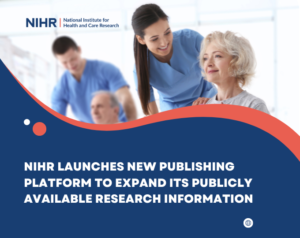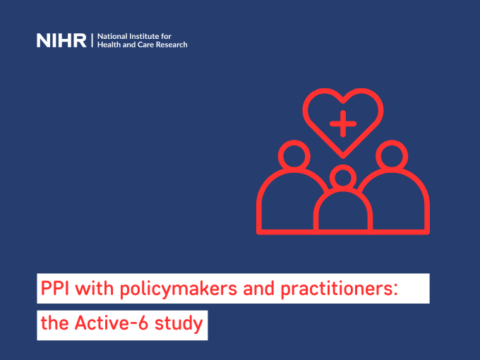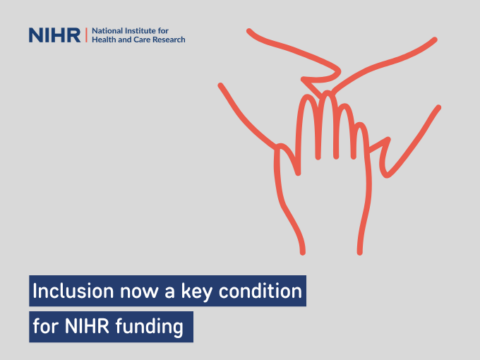
NIHR Open Research adopts F1000’s unique post-publication open peer review model, which gives users not only confidence that new findings have been reviewed by experts but also the opportunity to see for themselves who has reviewed the study and what they said about it.
NIHR has launched a new publishing platform that allows researchers to rapidly publish any research information they wish to share, supporting transparency, reproducibility and impact from publicly funded research.
NIHR Open Research allows NIHR researchers to publish not only study findings but also incremental findings, case reports and even negative findings, thus supporting the entire life cycle of research.
Following a successful pilot, NIHR Open Research has now been opened up to all types of NIHR-funded and supported research. The platform uses a post-publication peer review model facilitated by F1000, which accelerates the publishing process while ensuring quality of the research.
Any NIHR research across clinical evaluation, technology development, health services, public health and social care can be published on NIHR Open Research. This approach means that researchers can put all information from their studies into the public domain, increasing the discoverability and reach of their research.
Making all types of research findings rapidly available on NIHR Open Research will mean that other researchers can build on new ideas straight away and avoid the risk of duplication, so that new treatments and interventions for patients will become available quicker. Research published on the platform also includes links to all supporting data, allowing reanalyses, replication and reuse, as well as making it easier for researchers to collaborate.
Professor Lucy Chappell, Chief Executive of the NIHR, said: “Research is best undertaken openly, transparently, and with all aspects available, to reflect the collaborative, team science approach endorsed by the NIHR.
“NIHR Open Research ensures that all types of findings from NIHR funded and supported research can be made freely available. Researchers will now be able to learn from the many small steps made by their peers as well as the big ones, and promising findings can be accelerated into benefits for patients and the public.”
Enhancing NIHR’s commitment to open access
NIHR has a longstanding commitment to ensuring that NIHR-funded research findings are discoverable and reusable to all. For example, NIHR is the world’s first health research funder to publish comprehensive accounts of its commissioned research within its own publicly and permanently available journals, via the NIHR Journals Library.
Together, NIHR Open Research and the NIHR Journals Library ensure that findings from all NIHR-funded and supported research are publicly available, which, along with NIHR’s new open access policy that came into place this month, widen and enhance NIHR’s commitment to open access.
NIHR Open Research adopts F1000’s unique post-publication open peer review model, which gives users not only confidence that new findings have been reviewed by experts but also the opportunity to see for themselves who has reviewed the study and what they said about it. Publishing before peer review means that other researchers can benefit from accessing the work during the reviewing period.
Opening up to all NIHR researchers
NIHR Open Research has been piloted using research findings from studies funded by the NIHR Research for Patient Benefit (RfPB) programme, to increase the transparency of the RfPB portfolio. NIHR Open Research is now available for article submissions from across all NIHR research programmes, infrastructure, schools and units.
Professor Christian Mallen, a member of the NIHR Open Research Advisory Board and an NIHR Research Professor, said: “It is critical that research is easily accessible and available to all. Only then can we start to join together the different parts of the jigsaw that will allow us to improve outcomes for patients.
Prof Mallen, who is also National Director of the NIHR School for Primary Care Research, added: “All NIHR researchers can now use this exciting new platform to share any type of finding from their research, making their work visible not only to peers and potential collaborators but also to health and care professionals, policy makers, patients and service users, increasing the reach and potential impact of their research.”
A new threaded publication model is being piloted by the NIHR Journals Library, which will bring together the various elements of an NIHR-funded project through peer-reviewed articles published in the NIHR Journals Library alongside other relevant articles from academic journals and NIHR Open Research. This will collate a full account of the research, summarised in a synopsis, synthesising the whole research project together.
The threaded publication model means that the different elements of research projects can be published individually and at the point that they are ready. This will build the story of the research and findings over time, as a project progresses, supporting a more transparent, timely and discoverable approach to publishing.
- Visit the NIHR Open Research website
- For more information and questions, contact info@openresearch.nihr.ac.uk
Find more top tips for publishing on our ‘Essential Tools’ page – https://www.dementiaresearcher.nihr.ac.uk/essential-tools/

 Print This Post
Print This Post





